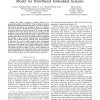378 search results - page 23 / 76 » Programming with Explicit Security Policies |
123
Voted
EUROSYS
2008
ACM
15 years 11 months ago
2008
ACM
Eudaemon is a technique that aims to blur the borders between protected and unprotected applications, and brings together honeypot technology and end-user intrusion detection and ...
139
Voted
IWFM
2000
15 years 4 months ago
2000
Security services in a multi-user environment are often based on access control mechanisms. Static of an access control policy can be formalised using abstract algebraic models. W...
197
Voted
POPL
2012
ACM
13 years 10 months ago
2012
ACM
It is becoming increasingly important for applications to protect sensitive data. With current techniques, the programmer bears the burden of ensuring that the application’s beh...
128
Voted
RTAS
2009
IEEE
15 years 9 months ago
2009
IEEE
—We define a family of execution policies for a programming model called PTIDES (Programming Temporally Integrated Distributed Embedded Systems). A PTIDES application (factory a...
124
click to vote
USS
2008
15 years 5 months ago
2008
In this paper, we present an approach for verifying that trusted programs correctly enforce system security goals when deployed. A trusted program is trusted to only perform safe ...

